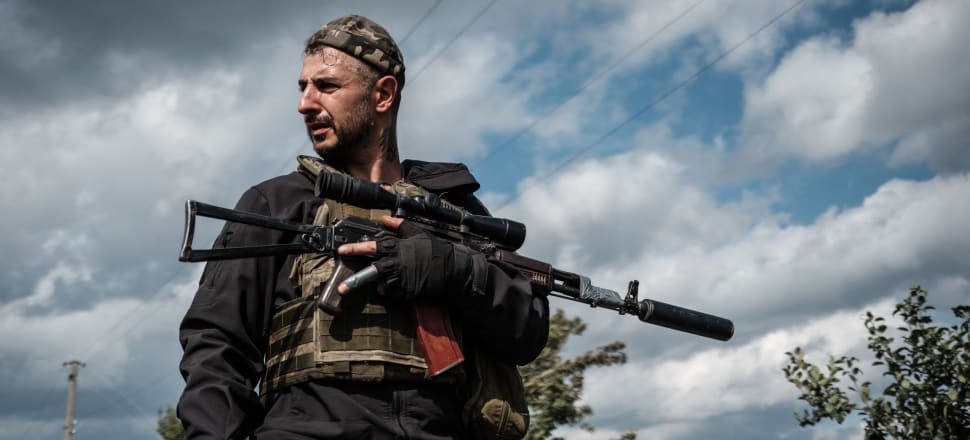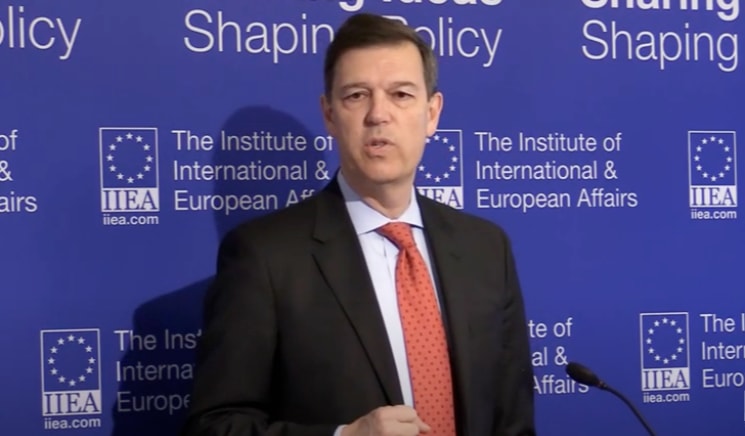
Kyiv's recent wins against the Russian invasion have led some to dream of Putin being driven out of Ukraine with his tail between his legs - but such an outcome is highly unlikely, according to experts who warn of a protracted conflict
The Russian invasion of Ukraine may be heading towards either a bloody stalemate or an escalation involving direct conflict between the world’s largest two nuclear powers, a former CIA analyst has warned.
However, experts remain optimistic there is still a path to peace if both sides can be persuaded to head to the negotiating table and reach a diplomatic accord.
The state of the conflict in Ukraine, and the potential paths ahead, was the topic of discussion at an event hosted by non-partisan Kiwi foreign policy think-tank Diplosphere on Monday.
More than six months on from Vladimir Putin’s “special operation” into Ukraine, the tide appears to have turned with Ukrainian forces regaining territory through counter-offensives.
George Beebe, a former chief of the CIA’s Russia analysis now at US thinktank the Quincy Institute for Responsible Statecraft, told the audience it was clear the Russians had not anticipated how difficult the invasion of Ukraine would prove.
“Everybody involved in this war is discovering that it's a lot easier to get into a war than it is to get out of it successfully.”
The initial offensive had included a large number of troops armed with riot control gear, Beeby said, believing their biggest challenge would be maintaining order during their occupation rather than the actual conquest.
Despite pivoting from an attempt to seize the capital of Kyiv to establishing control of the eastern provinces and creating a land bridge to Russia, progress had been slow.
Ukrainians continued to withstand a “relentless barrage of artillery and rocket attacks” with the support of Western resources, although it was unclear whether recent gains could be turned into a decisive win.

“It is one thing to take advantage of any weakness in the Russian lines to achieve a breakthrough - it's another thing to seize and hold vast amounts of territory that are now under Russian occupation, [and] it's very much an open question whether Ukrainians are going to be able to do that over time,” Beeby said.
If the current trends continued, there were two probable outcomes: either a bloody stalemate which destroyed Ukraine, or an attempt at escalation which ended in “direct military confrontation between the world’s two largest nuclear powers”.
Turkish ambassador to New Zealand Ömür Ünsay said her country’s government would continue to play a mediating role between the two sides of the conflict, having previously helped to broker an initiative to keep grain and other foodstuffs flowing out of Ukrainian ports through the Black Sea and into export markets.
Ünsay was hopeful the agreement could be extended beyond its current expiry date of late November, although Ukraine’s recent military gains could threaten such an outcome.
She did not believe total isolation of Russia would be enough to end the war, and said diplomacy was the only way through, albeit with some way to go.
“I think the image of Russian forces, they're tarnished: they need some face-saving victories to pretend as if they have reached their goals, and then they would be inclined to sit at the table or to be able to say that, ‘Okay, that's what we have wanted, now we can negotiate.”
Richard Jackson, the director of the University of Otago’s National Centre for Peace and Conflict Studies, also believed a negotiated settlement rather than a military victory was the most likely way to end the war.
“These days, wars can hardly ever be decisively won, for technological reasons but also strategic reasons…and there really is no military solution to this conflict now that it's underway.”
Outright military victory 'complete fantasy'
Jackson argued New Zealand had “adopted the simple narrative about the wrongness of the Russian invasion” and followed the lead of its Western partners too eagerly, which he believed compromised the country’s claims to an independent foreign policy.
The Government’s “tacit tolerance” of Kiwis heading to Ukraine as foreign fighters could also undermine its approach to countering violent extremism, he said.
However, former trade minister and ambassador Tim Groser disagreed with Jackson’s views of New Zealand’s decision to support Ukraine, saying an independent foreign policy was not synonymous with neutrality but simply meant making our own decisions based on the merits of each issue.
But Groser did believe the idea of an outright military victory was “a complete fantasy”, and said New Zealand should do what it could to support a diplomatic agreement while continuing to support Ukraine in its defence.
Asked about the American approach to the war, Beeby said US foreign policy had moved from “trying to prevent competition from spiralling out of control, to one of defeating our enemies”.
“If you take that kind of approach and apply it to great powers, like Russia, and China, I think you're in for an extremely dangerous set of outcomes, and that's where we are right now.”
The future of the relationship between Russia and Europe also came with risk, he said, with European nations needing to find some way to include Moscow in the regional order despite its aggressions.
While there were grounds for pessimism about the path ahead, Beeby said it was too early “to throw up our hands and say there’s nothing that can be done”, with opportunities remaining to avoid disaster through a settlement.







